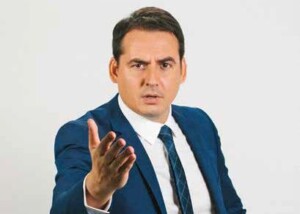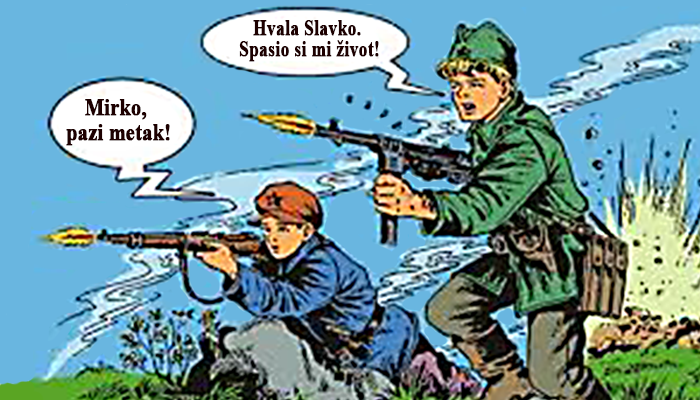There are three possible answers: a) tell the truth – that neither of my grandfathers were in the war, they were taking care of their families, and have successfully stayed out of trouble, b) lie, and say my granddad was a Partisan, c) place a traditional hat on his head, complete with a kokarda pin, grow him a beard, and send him his way to the Chetniks.
I rule out d) right away as too silly, although I personally find it hilarious – ‘my grandfather was a German’.

Writen by: Zoran Kesic
‘Where was your granddad in ‘41?’ The question came from my ninety-year-old neighbor, Miodrag. We visited him in his garden so the kids would have a play with the animals, and I would shoot some hoops on the old, improvised hoop stuck to a pole, built by the old man himself three decades ago.
I can tell he’s happy we are there. The children laughing, the hoop serving its purpose, talking to the ‘youngsters’ – he felt good.
It’s a beautiful morning out on the mountain.
They brought out a chair for him, so that he could sit, watch the children play, and talk about the building of the dam, where my grandfather was retired from in ’41.
One by one.
The dam is an incredible human achievement.
Grandpa Miodrag himself was part of the building projects, over half a century ago, and he remembers the machinery. He describes it with such passion and an eye for detail, the way a child would excitedly talk about a robot from its favorite film.
It was as if those enormous, powerful, and long forgotten machines have now materialised in his garden, and he is presenting them, praising each and every one.
And the machines love him too, you can tell. They are kind in listening to his story, humming in content, reminiscing of the glory days back when they tamed the river together and created this lake, which provides the whole city with water to this day.
The city, yes, but unfortunately not the surrounding villages; water is still precious in Miodrag’s village to this day.
‘The local government doesn’t have an interest in providing the plumbing’, he says.
‘Not very many voters here, and it is an expensive investment. We find our way around it – we’ve got wells, the stream, which is dryer by the day.’
In hearing that, the machines got upset, said farewell to their old mate and colleague, and drove down to the city – some urgent admin business in the city hall, I’m sure.
‘Where was your granddad in 41?’ – he opened up a new topic of conversation.
I liked Miodrag, I didn’t want to disappoint him. My brain worked fast, and in a second I’d come up with three possible answers:
- a) tell the truth – neither of my grandfathers were in the war, they were taking care of their families, and have successfully stayed out of trouble, b) lie and say my granddad was a Partisan, c) place a traditional hat on his head, complete with a kokarda pin, grow him a beard, and send him his way to the Chetniks.
I rule out d) right away as being too silly, although I personally find it hilarious– ‘my grandfather was a German’.
I thought that it would be a lesser evil to disappoint Miodrag with the ‘wrong army’, than admit the cowardly evasion of war, so I take a risk and decide on lie b) he was a Partisan.
‘Which unit?’, he won’t let my benign lie go just like that.
Luckily, I remembered that in the latest issue of ‘Vreme’ I’d read an interview, , literally the day before, with the last living war hero in Serbia, so I quickly placed my grandfather in the hero’s real unit, Sremski Partizanski Odred.
‘Ah, Vojvodina… they had it easier than we did over here in the mountains’, said Miodrag.
‘Well, yes’, I improvised, ‘it’s all flat, you can see right where the enemy is’, and I immediately regretted it.
Luckily, my host didn’t pay attention to the plot holes and lack of logic in ‘my grandfather’s partisan memoirs’, but rather acknowledged me as a legitimate partner for a conversation about the war, and he told me about what he remembered.
He was 10 years old, and too young to fight. His father was forced to join the Chetniks. He didn’t want to, he had to.
The Chetnik unit, along with Miodrag’s unwilling father, went along to burn some communist houses in the nearby village, when his father cried ‘I can’t burn this much wealth!’. There weren’t any people inside, but he knew how much effort it took to build and maintain a good household, the land, the cattle… it was a shame. They burned him as a traitor, along with the red house, and went along to complete their other mundane tasks.
Not long after, right there, where Miodrag built the dam years later with the machinery – Partisans went to ambush the Chetniks. The two Partisans disguised themselves as ‘the bearded men’, in full uniform. They ran into a mother with two boys.
‘Where are you headed?’ the fake Chetniks asked.
‘We’re running away from the evil communists’, the woman replied, and so the fake Chetniks and the real communists killed her sons. What they did to her isn’t written down in history.
Neither are Miodrag’s burned father, nor the two murdered sons. But Miodrag remembers.
I also couldn’t find anything on Google about the machines that were used to build the dam. There are a few things about the dam, about its width, length, the year it was built, but nothing about the machines. Miodrag remembers though.
And once he is gone, his intimate history of the dam, and of the fratricidal war in the physical space of his youth, life, and old age will fade too. An entire history, set in a few square kilometres of forest, mountain and river. Not enough for a book, just enough for a conversation on a beautiful morning in the mountains.
It’s not much, but it comes from the heart.
Much like my friend’s agricultural pension – 11,000 dinars (less than 100 euros).
‘Did your grandfather have a war pension?’ – he asked me.
I lie, and say that he did. Miodrag seems content, nodding his head in approval.
‘Those were good pensions, and for good reason.’



Leave A Comment